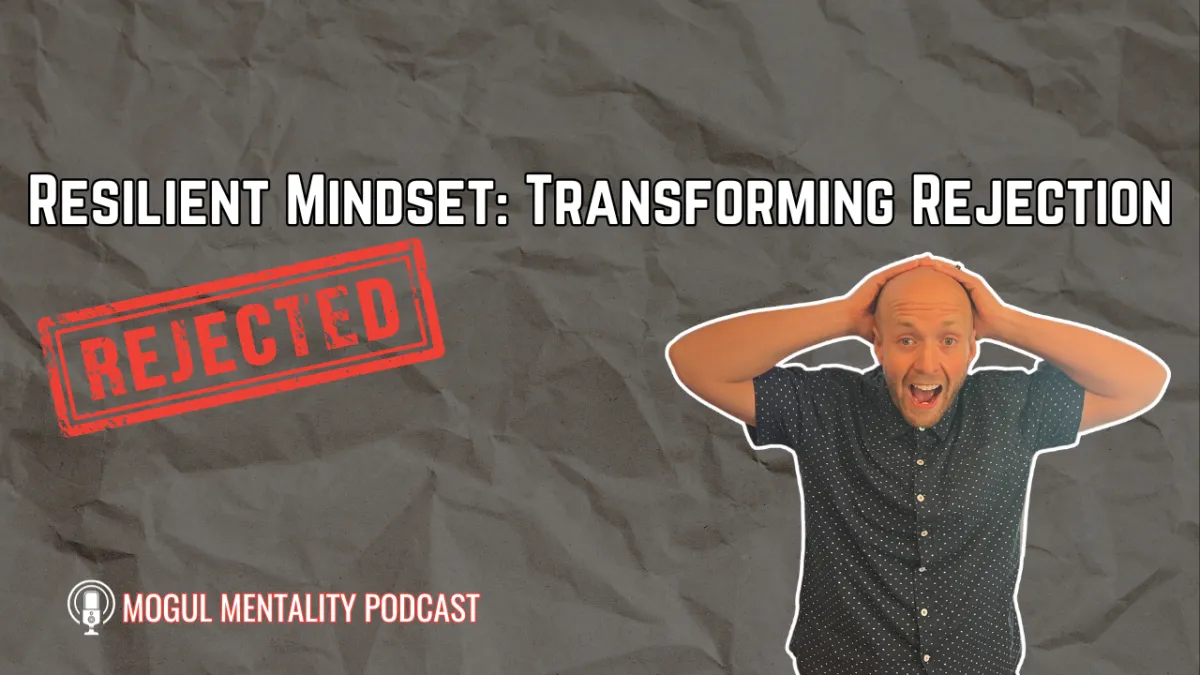
Mastering the Art of Handling Business Rejection Successfully
Mastering the Art of Handling Business Rejection Successfully
As business professionals, we all experience rejection at some point in our careers. Whether it's a rejected business proposal or a failed sales pitch, rejection can be a difficult and discouraging experience. However, it's important to remember that rejection is not the end of the road. In fact, it can be an opportunity to learn and grow.

In this section, we will explore key strategies and techniques to help you effectively handle business rejection. We will discuss how to cope with the disappointment of rejected business proposals, overcome the fear of rejection, and turn setbacks into opportunities for growth.
Key Takeaways
Handling business rejection is a common experience in the business world.
Rejection can be an opportunity for learning and growth- coping with business proposal rejection.
It's important to develop strategies to cope with the disappointment of rejection.
By overcoming the fear of rejection, you can become more resilient in the face of setbacks.
Setbacks can be turned into opportunities for growth and development.
Strategies for Coping with Business Rejection
Dealing with rejection in business can be tough, but it's not the end of the road. With the right strategies, we can learn to cope with rejection and emerge even stronger. Here are some ways to bounce back from rejection- overcoming rejection:

Developing Emotional Resilience
One of the first steps in coping with rejection is to develop emotional resilience. This means learning to manage our emotions in the face of setbacks. We can do this by:
Practicing mindfulness and meditation to stay centered and calm.
Talking to a trusted friend or mentor about our experiences and how we feel.
Taking care of ourselves physically by exercising, eating well, and getting enough sleep.
By developing emotional resilience, we can better handle the disappointment and frustration that comes with rejection.
❌Ready to conquer business rejection and thrive? Click the link to unlock the secrets of resilience for entrepreneurs. Overcome setbacks, build inner strength, and turn rejections into opportunities for unstoppable success!❌
Bouncing Back from Rejection
Another key strategy for coping with rejection is to learn to bounce back. This means using rejection as a catalyst for growth and learning. Here are some ways to bounce back:
Take time to reflect on what went wrong and how you can improve for next time.
Look for new opportunities and ways to pivot in your business.
Remember that rejection is not a reflection of your value or worth as a person. It's simply a part of the business world.
By bouncing back from rejection, we can turn setbacks into opportunities for growth and success.
Dealing with Sales Rejection
Dealing with sales rejection can be particularly difficult to handle, as it often feels personal. However, it's important to remember that sales rejection is not about us as individuals. It's usually about factors outside of our control, such as budget constraints or a lack of interest in our product or service. Here are some ways to deal with sales rejection:

Practice active listening and ask for feedback from potential clients to gain insight into why they may not be interested.
Refine your sales pitch and approach to better address the needs and pain points of potential clients.
Remember that every "no" brings you one step closer to a "yes."
By developing emotional resilience in business, we can learn to handle sales rejection and increase our chances of success.
Building Resilience and Learning from Rejection
Resilience in business management- As we navigate the ups and downs of business, rejection is an inevitable part of the journey. However, it's important to remember that rejection doesn't have to define our success. Instead, we can use rejection as an opportunity to build resilience and learn valuable lessons for future success.
Resilience in Business Management
Building business resilience starts with strong leadership and effective management. As entrepreneurs and business leaders, we must create a culture of resilience in the workplace and encourage our teams to develop mental strength in the face of rejection. By fostering resilience and a growth mindset, we can create a team that is better equipped to handle setbacks and ultimately achieve long-term success.

Building Business Resilience
Just as individuals can build resilience, businesses can also develop a stronger capacity to handle rejection and overcome setbacks. This involves creating a solid foundation with clear values, a strong mission, and a vision for the future. When businesses have a clear sense of purpose and direction, they are better equipped to navigate the challenges that come with rejection and emerge stronger on the other side.
Lessons from Failed Business Proposals
While rejection can be difficult to swallow, it can also provide valuable lessons from failed business proposals. for future success. When a business proposal is rejected, it's important to take the time to analyze what went wrong and what can be learned from the experience. By reflecting on our failures and learning from our mistakes, we can ultimately become more resilient and successful in the future.
Strengthening Mental Resilience Against Rejection
Developing mental resilience is crucial for handling rejection in business. This involves cultivating a growth mindset, building self-confidence, and practicing self-care. When we have a strong sense of self-worth and the tools to manage our emotions, we are better equipped to handle rejection and bounce back stronger than before.

Building Resilience in the Workplace
To build resilience in the workplace and learning from rejection, it's important to create a culture that prioritizes mental health and well-being. This can include offering employee training programs, creating a supportive work environment, and providing resources for stress management and self-care. By investing in our team's mental health, we can create a workplace that is better equipped to handle rejection and ultimately achieve long-term success.
Resilience in Business
At the end of the day, rejection is an inevitable part of business. However, by building resilience and learning from our experiences, we can turn setbacks into opportunities for growth. By cultivating mental strength, creating a culture of resilience, and reflecting on our failures, we can become better equipped to handle rejection and ultimately achieve success in business.
Discover the power of resilience! Join me in my latest YouTube video as we explore the transformative journey from rejection to success. Embrace a resilient mindset and unlock your true potential today!⬇️🎥💥
FAQ
How can I cope with the disappointment of rejected business proposals?
Coping with the disappointment of rejected business proposals can be challenging, but there are strategies you can use. It's important to remember that rejection is a normal part of the business world. Take the time to process your emotions, seek support from colleagues or mentors, and learn from the experience. Look for new opportunities and ways to improve your proposals based on the feedback you received. Remember, every rejection is an opportunity for growth.

How do I overcome the fear of rejection in business?
Overcoming the fear of rejection in business takes time and practice. Start by reframing rejection as a learning opportunity rather than a personal failure. Build your confidence by setting realistic expectations and celebrating small successes. Surround yourself with a supportive network and seek feedback on your work to help improve your skills. Remember, everyone experiences rejection at some point, and it does not define your worth or abilities.
What can I do to effectively deal with rejection in sales?
Dealing with rejection in sales can be tough, but there are strategies you can use to navigate this challenge. Focus on building relationships with your clients and understanding their needs. Develop a growth mindset that allows you to view rejection as a chance to learn and improve your sales approach. Practice resilience by maintaining a positive attitude, staying persistent, and seeking feedback to refine your sales techniques.

How can I develop emotional resilience in business?
Developing emotional resilience in business is essential for navigating rejection and setbacks. Start by practicing self-care and managing your stress levels. Build a strong support network of colleagues, mentors, or friends to lean on during challenging times. Cultivate a growth mindset that embraces failures as opportunities for growth. Develop healthy coping mechanisms such as mindfulness, exercise, or journaling to help you process and bounce back from rejection.
What can I learn from failed business proposals?
Failed business proposals can provide valuable lessons for growth and improvement. Take the time to analyze the reasons behind the rejection and identify areas where you can make adjustments. Look for patterns or common feedback that can help you refine your approach in future proposals. Embrace the opportunity to learn from mistakes and use them as stepping stones towards success.
How can rejection be a stepping stone to success?
Rejection can serve as a powerful catalyst for growth and success. Every rejection provides an opportunity to learn, improve, and refine your skills. It pushes you to think creatively, explore new approaches, and develop resilience. By embracing rejection as a natural part of the business journey, you can use setbacks as fuel to propel you closer to your goals.
What techniques can I use to build resilience in the workplace?
Building resilience in the workplace requires a combination of self-awareness and practical strategies. Practice self-care to ensure you are physically and mentally well-equipped to handle challenges. Develop a growth mindset that sees setbacks as opportunities for growth. Seek feedback and learn from failures. Surround yourself with a supportive network and cultivate positive relationships with colleagues. Finally, maintain a sense of purpose and alignment with your goals to stay motivated and resilient.
How can I strengthen my mental resilience against rejection?
Strengthening mental resilience against rejection takes practice and self-reflection. Cultivate self-awareness and recognize negative thought patterns. Challenge these thoughts by reframing them in a more positive and constructive light. Practice resilience-building activities such as mindfulness meditation, journaling, or engaging in hobbies that bring you joy and fulfillment. Seek support from mentors, friends, or professionals to help you develop effective coping mechanisms and strategies.
What is the key to long-term success in the face of business rejection?
The key to long-term success in the face of business rejection is resilience. Developing the ability to bounce back from setbacks, learn from failures, and adapt to challenges is crucial. Embrace rejection as an opportunity for growth rather than a personal failure. Continuously improve your skills, seek feedback, and stay persistent. Remember, success is not defined by the absence of rejection but by how you respond and grow from it.

